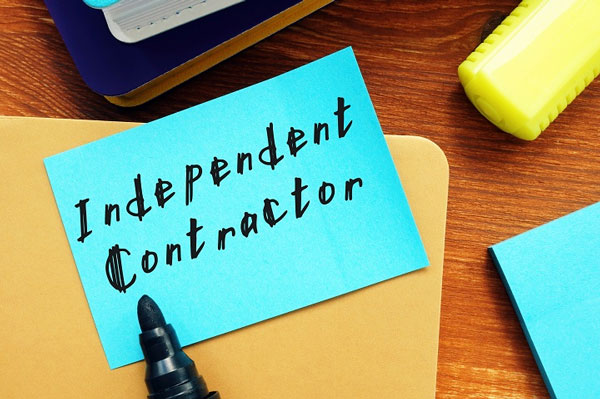Complete Guide: How To Report and Pay Independent Contractor Taxes?
Dec 05, 2023 By Susan Kelly
Introduction
You are likely self-employed or a gig worker if you provide services to businesses or individuals independently while working on your own time. Because the money you make is considered income from your business, you must pay income taxes and any other applicable taxes. When you have employees, you will be responsible for paying additional taxes. It is beneficial to understand the taxes you will be expected to record and pay if you are thinking about becoming an independent contractor or if you already are one. This will allow you to better prepare for tax season.
What Is an Independent Contractor?
Someone who provides their services to the general public on their initiative is known as an independent contractor (IC). People who work in dentistry, medicine, or law professions may be self-employed as independent contractors. They could also be employed in skilled crafts such as electrical work, building contracting, or plumbing. Service workers or gig workers, such as rideshare drivers or freelancers, could also be included in this category. To be considered an independent contractor, you don't need to register your company as a particular category. A sole proprietorship is the sort of business deemed standard for taxation reasons. This type of business consists of one individual and is not organised as a corporation. The other kind of corporation frequently used for ICs is the limited liability company with a single member or owner (SMLLC).

Who Pays Independent Contractor Taxes?
Independent contractors must often pay taxes on self-employment. Therefore, although it is possible that employers are not liable for withholding and paying taxes for these workers, they must nonetheless exercise caution to avoid incorrectly classifying employees as independent contractors. The line between the two is not always easy to draw and will vary from one instance to another depending on the situation's specifics.
How to File Your Taxes if You Work on Your Own as an Independent Contractor?
You will need information on your income and expenses for the year before you can begin the process of submitting your business income tax return. This information can be found in your business's financial records. You should generate a profit-and-loss statement, often called an "income statement," and keep in-depth descriptions of your expenses to back up the deductions you intend to claim.
Tips for Filing Taxes as an Independent Contractor
The following are some suggestions that can assist you in lowering your tax liability and avoiding problems associated with tax audits.
Lowering Your Business Tax Bill
No one likes paying income taxes, but you can minimise your tax liability by deducting as many lawful business costs as feasible if you own a business. In addition to claiming all the allowable deductions, you may be eligible to apply various tax credits related to your company activities. Two examples are a tax credit for providing employees with health insurance and an honour for providing job opportunities to disadvantaged people in the labour market.
Recordkeeping From Startup to Tax Filing
While providing every piece of business documentation in support of your tax return is unnecessary, doing so could prevent audit errors. It is critical to maintain impeccable records since the Internal Revenue Service scrutinises various tax deductions, including those related to home office space and vehicle expenses. For instance, if you have expenses related to driving, you need to establish records right once that contains the date, the mileage, and the business purpose of the trip.
Getting Help with Independent Contractor Taxes
Taxes on businesses are notoriously difficult to understand, as there are a plethora of stipulations, restrictions, and exemptions to take into account. For instance, even a deduction that appears to be straightforward, such as the one for the use of your house for business, is fraught with complications. Finding a registered tax professional to assist you with preparing your company's tax return might save you money and improve your chances of passing a tax audit.
Calculating Self-Employment Taxes as an Independent Contractor
You must pay a self-employment tax of 15.3% on 92.35% of your net self-employment earnings in 2022. Your net self-employment earnings are calculated by subtracting your payments as an independent contractor from your necessary and ordinary business expenses. Why 92.35 percent rather than 100 percent? Because the remaining 7.65% is a deduction that essentially represents the FICA tax that your employer would pay if you were an employee rather than a self-employed person and because you are not an employee. This tax can be deducted as a legitimate business expense by the employer. It can be discouraging to realise that you must pay that much additional money on top of your income taxes. The good news is that you can take an above-the-line deduction for half of your self-employment tax.

Conclusion
If you work as an independent contractor rather than for another company as an employee, you are treated more like a business owner. Any payments you withdraw from your company are counted as withdrawals from your owner account on your business's balance sheet (also known as "owner's equity"). No matter how much of your company's annual net revenue you take out for your use, you will still be subject to taxation on the total amount of that income.
As a result of the fact that federal income taxes in the United States are collected on a "pay-as-you-go" basis, taxpayers, in most cases, are unable to put off figuring out their tax liability until the end of the year. Instead, the Internal Revenue Service mandates that you calculate an estimate of your tax burden and make payments toward it throughout the year by your changing income.

401(a) vs. 401(k): What’s the Difference?
Feb 22, 2024
Educate yourself on the differences between 401(a) and 401(k) plans and determine which could benefit your retirement. Unlock financial insights today!

Is Chesapeake Life Insurance Right for You? An In-Depth Review
May 09, 2024
Explore why Chesapeake Life Insurance, with its comprehensive coverage options and solid financial backing, may be the ideal choice for your life insurance needs.

Innovative Gifts for College Funding
Dec 13, 2023
If your loved one is feeling down, include puzzles, crossword puzzle books, adult colouring books with markers, board games, word searches, and other activities in a care box.

Understanding Assets: Comprehensive Definitions and Varieties
Dec 27, 2023
Get a better understanding of assets with this guide. Here, we define what assets are and explore the different types of assets.

Penny Stocks to Watch in Q3 2022
Nov 20, 2023
There's been a lot of volatility in the stock market since the beginning of 2022. Investors are split between protecting themselves and taking advantage of the possibilities in the current economic climate. Despite the economy's current state, a plethora of attractive investments can be made right now.

How Excess of Loss Reinsurance Operates in the Insurance Industry?
May 08, 2024
Explore the crucial role of Excess of Loss Reinsurance in managing catastrophic risks, its benefits, claims process, and future trends in the insurance industry.

Avoid Capital Gains Tax on Your Asset Property
Nov 20, 2023
Match defeats Investors can take losses to balance out and offset their gains for a given year. Savvy investors collect capital losses as they happen and use them to reduce their present and future tax obligations. Extra losses that aren't applied to gains can be used to offset ordinary income up to $3,000 in total.

Understanding Home Appraisals
Jan 13, 2024
Have you ever wondered why home appraisals are so important? Read on to find out how home appraisals can affect your ability to purchase a new property and get tips for getting the most out of yours.

Charles Schwab Review: The Financial Advisors You Can Trust
Mar 15, 2024
This article provides a comprehensive review of Charles Schwab financial advisors to discuss their reliability with financial services

Legal Status of Airbnb in Major Cities
Jan 25, 2024
Airbnb is a popular choice among thrifty vacationers since it is a short-term rental business that allows property owners as well as renters to earn extra money by renting out their homes to other guests. On the other hand, it might be a difficult task for regulatory bodies all over the globe.

Reason of Trade Broken Trendlines
Feb 03, 2024
When technical traders want to gain a rapid notion of the trend or direction of an asset, one of the simplest methods to do so is to plot the trendlines of a security's price action onto a chart.

Amazon's Mystery Pallet Returns: Bargain or Risky Bet?
Nov 22, 2023
Are Amazon return pallets a great way to get a bargain or an uncertain investment? Learn how to profit from them, along with some professional advice.